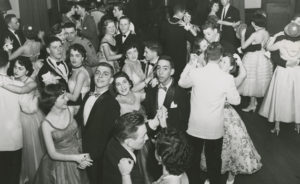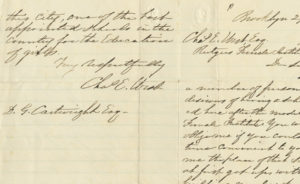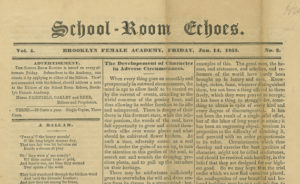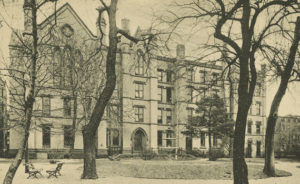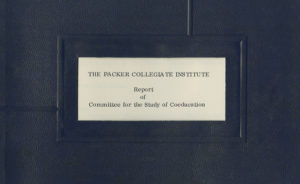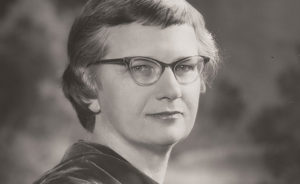The Packer Collegiate Institute: A Story of Education in Brooklyn
My Johnny Was Fighting at that War
Lucy Freedman

Elizabeth Loreto, Johnny, PCI, 1973; Packer Collegiate Institute records, 2014.019. Box 127; Brooklyn Historical Society.
In 1973, Packer Collegiate fifth grader Elizabeth Loreto published a poem entitled “Johnny” in the Packer Current Items (PCI), Packer’s annual arts and literary magazine. The poem talks about the author’s sadness about the war. How is it that 10-year-old Loreto came to write a poem in response to the Vietnam War and was this precocious activism typical of Packer students during times of war? That’s what I set to find out during my research and subsequent interview with Loreto, 44 years after she wrote the poem that shaped my research.

Fifth Grade, Pelican, 1973, document, Blackburn Library
During an interview with Loreto, she told me that her father worked as a newscaster for CBS, making TV a pretty huge part of her life growing up. Not only did both of her parents speak openly against the war, students in the Packer community shared their opinions as well, influencing what Loreto thought about the violence. I asked her, “Was TV news your primary source of news?” to which she responded: “absolutely… it was the way we got our news.”
Echoing Elizabeth Loreto’s own recollections, Albert Marrin writes in America and Vietnam: The Elephant and the Tiger that the Vietnam War was the first “television war,” explaining that TV news as the primary news outlet was typical of the whole country during the Vietnam War Era. President Lyndon B. Johnson came into the presidency in 1963 after Kennedy’s assassination and held office until 1969, putting him at the epicenter of the Vietnam War Era and making him instrumental in the ways the U.S. military engaged in the Vietnam War.
Peter C. Rollins writes in The Vietnam War: Perceptions Through Literature, Film, and Television that “Lyndon Johnson [had] direct access to such network executives as Frank Stanton (president, CBS) and Robert Kintner (president, NBC) further assur[ing] that Washington’s perceptions reached America’s living rooms.” The Johnson administration faced huge resistance on matters involving Vietnam, so it used television’s massive influence to convince the American people of why the Vietnam War was a war not only worth fighting, but for America to be fighting.
The introduction of televised violence that accompanied the increasing popularity of TV news changed the way Americans viewed and interpreted the actions of their government as well as their own role in what the U.S. was doing abroad. Loreto’s poem is proof that people of all ages around the country were protesting the war in the largest Anti-War Movement to date. Albert Marrin points out that never before had the American people expressed so much outrage and hatred towards their own country and denounced the U.S. government’s actions so strongly.
My research took me from 1973’s PCI back to 1964’s yearbook, in which Virginia Majain included the all-caps phrase “PEACE AND FREEDOM NOW!” as part of her senior quote section.

Virginia Majian’s Yearbook Section, Pelican, 1964, document, Packer Collegiate Institute, Blackburne Library
The resources in the Brooklyn Historical Society archive gave me a view into the intricacies of what resistance may have looked like for some Packer students and their families during previous times of social unrest and protest. Through this research I found evidence of students committing small acts of protest throughout Packer’s publications.
Even though they knew their message would stay within the Packer community, Loreto and Majian used the space given to them to express their beliefs. This feels reminiscent of today’s social media landscape. With so much information and so many opinions being constantly filtered through our feeds and everyone possessing a platform in their pocket with which to speak their minds, this no longer seems extraordinary. With so much information and so many opinions being constantly filtered through our feeds today, everyone being given a platform to speak their minds, this research allowed me to stop and appreciate someone’s actions from a time when there were so many less opportunities to be heard, showing that each act of protest, no matter how small, was ever so much more impactful.
May 2017
